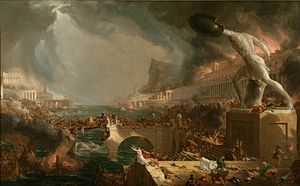The NYR Daily ran a short piece on Thucydides on October 29 written by Edward Mendelson in which he reads the ancient author as a guide to the current political turmoil in the age of Trump. His text reveals an interesting but limited interpretation of Thucydides.
First, Mendelson attempts to show the Plague (and the Sicilian debacle) as just recompense for the excesses of Athenian hubris. I would assert that this is only the surface of Thucydides’ edifying chronicle. Thucydides’ work appears to be a morality play in which Athens is the transgressor in order to highlight the ostensibly superior rectitude and religiosity of the Spartan regime. The more subtle teaching is that Athens’ almost boundless pursuit of excellence and glory leads her to expand beyond reasonable limits, but that, even then, it is mostly miscalculation and, to a lesser degree, natural vagaries (e.g., the Plague) that lead to Athens’ defeat.
For example, Mendelson refers to the Sicilian expedition as “immoral and impractical.” From the precarious position of Athens, engaged in a mortal clash of empires, it is neither. Thucydides shows that it was the removal of Alcibiades from command and the promotion of the feckless and religiously circumscribed Nicias that led to disaster. With the daring and astute Alcibiades at the helm directing resolute action, the outcome was up for grabs. As I noted elsewhere (See: “Hey Policy Wonks, This Is How You Should Read Thucydides”):
[A] close reading of Thucydides’ history demonstrates that Athens was compelled to compel Sparta to war. Athenian hegemony and naval empire, as well as the less well observed Spartan dominance and empire on land, Thucydides suggests, was necessitated by the Persian invasion and fortified by the apparent natural law of the prerogative of the stronger. Athens and Sparta are fated by historical circumstance and internal drive to rule.
Mendelson shows Thucydides as espousing a universal justice and a human ethics as a reflection of that cosmic order. The Peloponnesian War then seems like an epic moral struggle, which god-fearing, law abiding, moderate Sparta wins and arrogant, aggrandizing, bellicose Athens loses. The truth is just above and below this.
One of the principle problems of seeing Thucydides’ history as a morality tale is it turns the narrative into a didactive exercise that leaves little room for human agency. Accordingly, the prospective policy choices of Pericles or other Athenian leaders would inevitably fail to free Athens from the historical judgment of exceptionalism and corresponding hubris.
Hubris can be mistaken for realism particularly in a Type A society like Athens or the United States and, as Ozymandias shows, has lasting consequences. After all, restitution is not meted out by some godly arbiter based on an invisible morality law, but rather, in the worst case, on the field of battle (See: “Thucydides’ Ignored Lesson”), and in the best, at the ballot box.

































